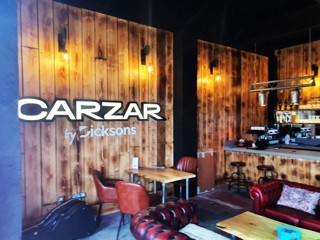Sean Kent, the director of the RAC Dealer Network, on consumers’ desire for longer warranties and the will among used car dealers to be accredited.
Five years on from the launch of RAC Dealer Network, how would you reflect on the business’s development?
I have been involved from the start, with The Warranty Group for the past 10 years, and the RAC brand licensing agreement started in August 2008. Back then, we were offering branded warranties and it was a good fit in many ways, and fit for purpose.
We knew that the used car programme was what we wanted to do, though. We carried on in the same vein until 2013, when we launched the RAC Dealer Network. On day one, back in March 2013, we launched with no approved dealers. At that time, we were working with 400 dealers on a warranty basis, but none of them was approved. This year, we hope to reach a stage where we have 1,400 to 1,500 dealers in the network. Of those, we would like to see about 400 fully approved, second-tier dealers. Within the next three years, we’d like to think our number of dealers could rise to 1,800 to 2,000, with 600 of those fully approved. The shift in what we offer has been considerable and the size of the network really does put us in a market-leading position. There’s nothing else like us out there.
What do you mean by a ’second-tier dealer’?
Our second-tier, or fully approved, dealers have access to a wider range of warranty products and assets, but are subject to regular audits carried out by our team of 40 inspectors. We also keep close tabs on review ratings and email customers to encourage them to leave a review of the service they received. Generally, our approved dealers don’t necessarily have to retail a certain number of cars, but they must
obviously have a permanent, car sales-specific premises, a stock profile above £3,500, be VAT-registered and, ultimately, meet our standards for 82-point pre-sale vehicle checks, car data checks and deliver the three-month warranty and 12 months’ RAC breakdown cover as part of their package.
How strictly do you police the standards that the RAC Dealer Network demands of its fully accredited dealers?
Wherever possible, we will work with a dealer if something is flagged up during an audit or they receive a particularly negative review. We have a 47-strong regional management team and they are there to offer support with a range of things, including marketing. The positive thing is that dealers tend to react when we go to them with something.
Independent retailers’ levels of service and customer care are very much up there with the best in the sector in my experience, but they may not be used to having their business audited or the same level of scrutiny that a franchised retailer might get from a manufacturer.
When we flag something, it often results in an immediate response. These are dealers who live and breathe the business and it’s a matter of pride to them to provide a good service. The RAC Dealer Network has an overall Net Promoter Score of 78.8. I’m no expert in that area, but I believe that is up there with the likes of Apple.
What is the most important aspect of such strict criteria?
The RAC always wanted a network of approved dealers for its customers that they could trust. Dealers benefit from being associated with the RAC brand but, equally, it’s vital for them to uphold that reputation. It’s a reciprocal
relationship. I think many independent dealers already have standards that compare very well to those of franchised dealers, but we are recognising and ensuring that, while promoting the fact to customers. We currently have 200 dealers fully accredited – that’s bigger than many manufacturer networks – and ultimately we would like to be seen as the voice of a very good-sized independent dealer network.
Are there other incentives – alongside the wider product range and kudos of RAC branding – that the Dealer Network delivers to partner dealers?
I’ve already mentioned the support from our field team, but increasingly we are promoting our digital assets as a way for dealers to benefit from the shared knowledge and data that is generated by sales through the entire network.
We launched an online resource centre, The Engine, last year, which dealers can use to receive insight on a range of things. One of the biggest problems we faced was communication of market trends and things like that between our dealers.
The days of sticking a few flags on your forecourt and leaving it at that are gone. Digital resources are where we have placed a lot of our efforts. Depending on what tier you are in, you get access to some or all of the resource. Claims records, warranty stats with ranking of the most and least reliable cars and common reasons for failure in certain cars, market pricing, and customer reviews all sit on The Engine. It’s not that we’re trying to run dealers’ businesses, we just want to help them make informed decisions. The data we hold is comprehensive. For example, the average price of a vehicle sold within the network this year was £9,500, with an age of five years and six months. I think customers spending that much like the assurance that our dealers’ quality checks, provenance checks, warranty packages and roadside assistance provide.
There has been a major development in the ownership of The Warranty Group. How will that affect the way the RAC Dealer Network operates?
Back in June, Assurant bought The Warranty Group for $2.5 billion (£1.9bn). That tells you all you need to know about how much they value the business and how big an organisation Assurant is. It is a huge business, which operates in very similar areas to The Warranty Group and that makes for a very good fit.
The way the RAC Dealer Network operates will not be affected. There are new areas of development, but I think we are in a good place. The Warranty Group is in a strong position. It is its own underwriter and that will continue. The relationship with the RAC is strong, too. In essence, the RAC element is a licensing agreement and, despite there being three years left on the agreement, that has recently been extended for an additional three years.
What volume of warranty business does the RAC Dealer Network now generate?
In 2013, we dealt with about 100,000 units a year. This year, that will have grown to about 300,000. The total number of claims received so far in 2018 is just under 30,000, with an average pay-out of about £400. Our growth has been both organic, as we have grown with many of our dealers, and subject to market forces.
Our dealers range from Mark Berwick Motors in Perth, which probably sells about 30 vehicles a month, to the Carbase used car supermarket, which has been with us from the very start and we have grown with from two to four sites. We have also shed some dealers and added dealers of a higher standard, retailing greater numbers of cars in many cases.
Have you seen any change in customer demand during the past five years?
Absolutely, and that has contributed to our growth, too. We have seen a shift in consumer demand for longer warranties. When we started out, we required dealers to offer a three-month warranty, but most customers opt for six months and some are starting to opt for warranties that last for the lifetime of their vehicle. Over the past 12 months, we have seen a 10% drop in sales of three-month warranties and a corresponding 10% increase in six-month versions. We are about to launch a new, 10-month warranty product, which allows customers to pay monthly on an interest-free basis. There’s also a demand from customers to respond to enquiries much faster. Once, you might have had 10 hours to respond to a call. Now our average call answer time is 23 seconds.
What is the cost of the RAC Dealer Network warranties?
Most dealers will bundle the warranties into the sale, adding value for the customer. The average price for a dealer, for your average car – perhaps a Vauxhall Astra or Ford Focus – will be less than £100. That allows them to sell the vehicle as an approved car and I think that is a very realistic reflection of the cost pressure that they may face in the market. The level of support and peace of mind that provides to dealers is clear. Last year we honoured £8 million worth of claims. There’s also evidence of incremental sales growth as a result of being part of the network. One survey showed that the RAC name had an impact on 71.7% of customers’ purchasing decisions.
Are there plans to branch out further with the range of products offered to customers, in line with the one-stop-shop approach that seems to be gaining traction in the automotive sector?
We have just introduced a GAP product, which is Defaqto five-star rated. That has been in place for three months now, and uptake has been pretty good. As with the other products, it is interesting to see that trust that consumers place in the familiar RAC brand. We’re offering a product that people trust and we prize that.




















nadersaei - 04/10/2018 10:50
hello im mhamamd from iran